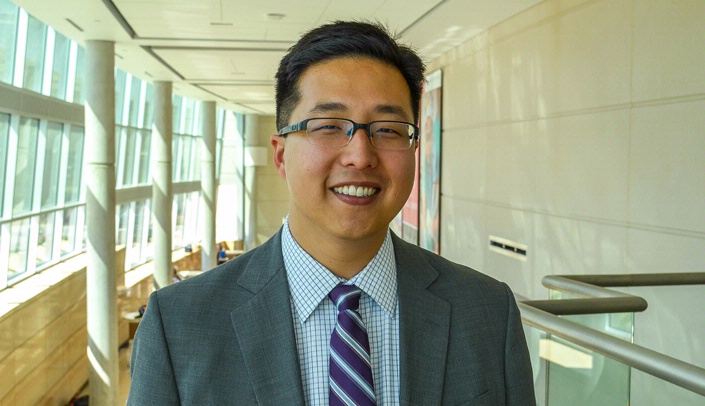Building a mental health workforce takes time, and it takes the energy of a lot of organizations and institutions working on smaller pieces of the same goal. When it comes to one piece of the workforce — the number of psychiatrists practicing in Nebraska — UNMC is beginning to see some promising outcomes at the medical school level.
In the last four years, the number of UNMC fourth-year medical students choosing elective rotations in psychiatry has increased dramatically. In the 2011-12 school year, just nine elective rotations were completed. In 2014-15, 69 electives have or will be completed — a 667 percent increase.
“The more students we are able to reach at the early stages of the educational pipeline, the better,” said Howard Liu, M.D., director of the Behavioral Health Education Center of Nebraska (BHECN). “More medical students interested in psychiatry become more residents interested in psychiatry. More residents ultimately means more psychiatrists.”
Sharon Hammer, M.D., clerkship director and assistant professor of psychiatry, attributed much of this growth to changes in the clerkship program. When third-year students complete their required six-week rotation in psychiatry, faculty spend time explaining the need for psychiatric knowledge for all students.
“My strategy is to really educate not only people who potentially want to go into mental health fields, but also people who are doing primary care,” she said.
The department also has increased the number and variety of electives for fourth-year students including psychiatry through the lifespan. Students who choose a correctional psychiatry rotation spend one month at the Lincoln Correctional Center with one-on-one supervision. Dr. Hammer also noted the importance of rotation options that are sub-internship and allow the students to function more like a first-year resident.
“What the students always say is, they want to be in charge, they want to engage at the level of an intern, they want to contribute to the team,” she said. “Students want to gain that confidence or a skill set to build on. These rotations help them get that experience.”
Fresh energy also contributes to growth. Dr. Liu’s and BHECN’s leadership has helped provide new perspective and direction to the program.
“Tying the goal of retaining mental health professionals in Nebraska has directly incentivized us in our teaching,” Dr. Hammer said. “Having that tangible measure of success that BHECN brings will help sustain the growth in the elective numbers.”
